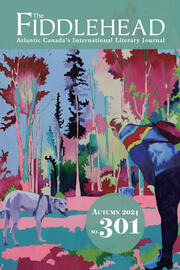stop-look-listen
Posted on February 11, 2014
The University of New Brunswick would like to invite you to a reading by noted ecologist Don Gayton, who will be reading from a selection of his works.
Bill Gaston & Michael Christie Read in Fredericton on February 4 at the Fredericton Public Library!
Posted on January 31, 2014
Bill Gaston and Michael Christie will be reading at the Fredericton Public Library next Tuesday afternoon, February 4 at 3pm.
Odd Sunday's @ Molly's: Ross Leckie and Sharon McCartney
Posted on January 31, 2014
The next odd sundays at Molly’s event, Fredericton’s longest-running, semi‐monthly, persistently‐hyphenated, poetry-reading series, will take place this Sunday (February 2nd) at 2 pm with featured poets, Sharon McCartney and Ross Leckie.
Fiddlehead Editorial Board Member Richard Kemick Wins Grain's Poetry Contest!
Posted on January 30, 2014
The Fiddlehead just received its copy of Grain in the mail today and we're pleased to congratulate Richard for winning the Short Grain Poetry contest with "A Note Left on the Dresser."
Breakwater Newfoundland Poetry Series: John Steffler
Posted on January 16, 2014
By Vanessa Moeller
I am a long-standing admirer of John Steffler's work. I find his beautifully crafted poems, with their deft use of language, visceral and epiphanic. The senses cannot help but come alive reading lines like "the tramped grass steamy as seaweed in the migraine / of noon" or "the bone flakes encrusting a bracelet / of kelp," but what sets this work apart is the understated manner in which it asks questions of the reader.
Breakwater Newfoundland Poetry Series: Michael Crummey
Posted on January 6, 2014
By Lorna Crozier
One of the things I admire about Michael Crummey’s work is his nod to traditional forms and the iambic pentameter line. They extend his long reach into the past, yet his poems feel innovative and new because of the subject matter and the toughness and tenderness of his voice. . . .
Photo by Chris Cameron
Breakwater Newfoundland Poetry Series: Carmelita McGrath
Posted on December 16, 2013
By Shoshanna Wingate
Carmelita McGrath holds a singular place in the heart of Newfoundland poetry. For an island that loves its poets, this is not a consolation prize for the weird auntie who likes her hats big and bright, but a heartfelt space created for a poet who inspired so many in their development. . . .
Photo by Kerri Cull
Breakwater Newfoundland Poetry Series: Richard Greene
Posted on December 9, 2013
By Jeffery Donaldson
Richard Greene begins: “I am at home in a high-rise.” You want to catch the nuance there: the descent motif, finding one’s ground among the contemporary urban domiciles; but also the ascent, the daily routine struggling to rise above itself. Greene’s poems are high-risers that seek a lifting leverage in high-rises. . . .
Introducing the Judges for The Fiddlehead's 23rd Annual Literary Contest
Posted on December 5, 2013
The Fiddlehead's annual literary contest is now closed, and we're pleased to announce this year's fabulous judges.
Breakwater Newfoundland Poetry Series: Patrick Warner
Posted on December 3, 2013
By George Murray
A transplanted Irishman, Warner fits into the Newfoundland anthology in two ways — first, as a poet who had a significant connection to the Rock before the publication of his first book (he’s been here for 33 years); and second, as a man of wit and stories from a culture of wit and stories. . . .

















